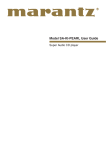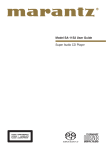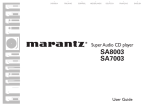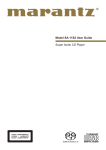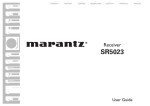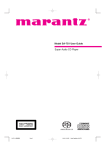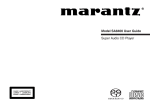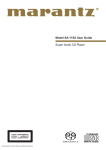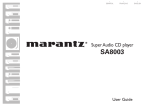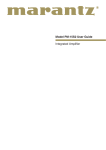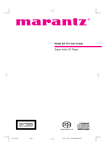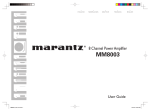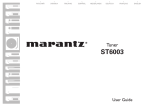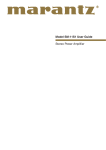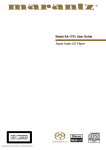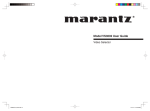Download Marantz SA-15S2
Transcript
Model SA-15S2 User Guide Super Audio CD player SA-15S2_UN_00_cover etc.indd 3 09.3.10 0:47:10 PM CAUTION RISK OF ELECTRIC SHOCK DO NOT OPEN CAUTION: TO REDUCE THE RISK OF ELECTRIC SHOCK, DO NOT REMOVE COVER (OR BACK) NO USER-SERVICEABLE PARTS INSIDE REFER SERVICING TO QUALIFIED SERVICE PERSONNEL The lightning flash with arrowhead symbol within an equilateral triangle is intended to alert the user to the presence of uninsulated “dangerous voltage” within the product’s enclosure that may be of sufficient magnitude to constitute a risk of electric shock to persons. The exclamation point within an equilateral triangle is intended to alert the user to the presence of important operating and maintenance (servicing) instructions in the literature accompanying the product. WARNING TO REDUCE THE RISK OF FIRE OR ELECTRIC SHOCK, DO NOT EXPOSE THIS APPLIANCE TO RAIN OR MOISTURE. CAUTION: TO PREVENT ELECTRIC SHOCK, MATCH WIDE BLADE OF PLUG TO WIDE SLOT, FULLY INSERT. ATTENTION: POUR EVITER LES CHOCS ELECTRIQUES, INTRODUIRE LA LAME LA PLUS LARGE DE LA FICHE DANS LA BORNE CORRESPONDANTE DE LA PRISE ET POUSSER JUSQU’AU FOND. LASER SAFETY This unit employs a laser. Only a qualified service person should remove the cover or attempt to service this device, due to possible eye injury. CAUTION : USE OF CONTROLS OR ADJUSTMENTS OR PERFORMANCE OF PROCEDURE OTHER THAN THOSE SPECIFIED HEREIN MAY RESULT IN HAZARDOUS RADIATION EXPOSURE. NOTE: - Reorient or relocate the receiving antenna. This equipment has been tested and found to comply with the limits for a Class B digital device, pursuant to Part 15 of the FCC Rules. These limits are designed to provide reasonable protection against harmful interference in a residential installation. This equipment generates, uses and can radiate radio frequency energy and, if not installed and used in accordance with the instructions, may cause harmful interference to radio communications. However, there is no guarantee that interference will not occur in a particular installation. If this equipment does cause harmful interference to radio or television reception, which can be determined by turning the equipment off and on, the user is encouraged to try to correct the interference by one or more of the following measures: - Increase the separation between the equipment and receiver. This Class B digital apparatus complies with Canadian ICES003. Cet appareil numerique de la Classe B est conforme a la norme NMB-003 du Canada. SA-15S2_UN_00_cover etc.indd 4 - Connect the equipment into an outlet on a circuit different from that to which the receiver is connected. - Consult the dealer or an experienced radio/TV technician for help. NOTE: Changes or modifications may cause this unit to fail to comply with Part 15 of the FCC Rules and may void the user's authority to operate the equipment. 09.3.10 0:47:10 PM IMPORTANT SAFETY INSTRUCTIONS READ BEFORE OPERATING EQUIPMENT This product was designed and manufactured to meet strict quality and safety standards. There are, however, some installation and operation precautions which you should be particularly aware of. 1. Read these instructions. 2. Keep these instructions. 3. Heed all warnings. 4. Follow all instructions. 5. Do not use this apparatus near water. 6. Clean only with dry cloth. 7. Do not block any ventilation openings. Install in accordance with the manufacture's instructions. 8. Do not install near any heat sources such as radiators, heat registers, stoves, or other apparatus (including amplifiers) that produce heat. 9. Do not defeat the safety purpose of the polarized or grounding-type plug. A polarized plug has two blades with one wider than the other. A grounding type plug has two blades and a third grounding prong. The wide blade or the third prong are provided for your safety. If the provided plug does not fit into your outlet, consult an electrician for replacement of the obsolete outlet. 10. Protect the power cord from being walked on or pinched particularly at plugs, convenience receptacles, and the point where they exit from the apparatus. 11. Only use attachments/accessories specified by the manufacturer. 12. Use only with the cart, stand, tripod, bracket, or table specified by the manufacturer, or sold with the apparatus. When a cart is used, use caution when moving the cart/apparatus combination to avoid injury from tip-over. 13. Unplug this apparatus during lightning storms or when unused for long periods of time. 14. Refer all servicing to qualified service personnel. Servicing is required when the apparatus has been damaged in any way, such as power-supply cord or plug is damaged, liquid has been spilled or objects have fallen into the apparatus, the apparatus has been exposed to rain or moisture, does not operate normally, or has been dropped. Additional Safety Information! • This product should not be placed in a built-in installation such as a bookcase or rack unless proper ventilation is provided or the manufacturer’s instructions have been adhered to. • Apparatus shall not be exposed to dripping or splashing and that no objects filled with liquids, such as vases, shall be placed on the apparatus. • When the switch is in the OFF position, the apparatus isn’t completely switched-off from the MAINS. • The equipment shall be installed near the power supply so that the power supply is easily accessible. • Do not expose the unit and batteries to excessive heat such as direct sunlight, fire or the like. • Make a space of about 4 inchs (0.1 m) around the unit. OPT_090122U2 SA-15S2_UN_00_cover etc.indd 5 09.3.10 0:47:10 PM ENGLISH WARRANTY For warranty information, contact your local Marantz distributor. RETAIN YOUR PURCHASE RECEIPT Your purchase receipt is your permanent record of a valuable purchase. It should be kept in a safe place to be referred to as necessary for insurance purposes or when corresponding with Marantz. IMPORTANT When seeking warranty service, it is the responsibility of the consumer to establish proof and date of purchase. Your purchase receipt or invoice is adequate for such proof. FOR U.K. ONLY This undertaking is in addition to a consumer's statutory rights and does not affect those rights in any way. NEDERLANDS GARANTIE Voor inlichtingen omtrent garantie dient u zich tot uw plaatselijke Marantz. UW KWITANTIE, KASSABON E.D. BEWAREN Uw kwitantie, kassabon e.d. vormen uw bewijs van aankoop van een waardevol artikel en dienen op een veilige plaats bewaard te worden voor evt, verwijzing bijv, in verbend met verzekering of bij correspondentie met Marantz. BELANGRIJK Bij een evt, beroep op de garantie is het de verantwoordelijkheid van de consument een gedateerd bewijs van aankoop te tonen. Uw kassabon of factuurzijn voldoende bewijs. ITALIANO FRANÇAIS GARANTIE Pour des informations sur la garantie, contacter le distributeur local Marantz. CONSERVER L'ATTESTATION D'ACHAT L'attestation d'achat est la preuve permanente d'un achat de valeur. La conserver en lieu sur pour s'y reporter aux fins d'obtention d'une couverture d'assurance ou dans le cadre de correspondances avec Marantz. IMPORTANT Pour l'obtention d'un service couvert par la garantie, il incombe au client d'établir la preuve de l'achat et d'en corroborer la date. Le reçu ou la facture constituent des preuves suffisantes. DEUTSCH GARANZIA L’apparecchio è coperto da una garanzia di buon funzionamento della durata di un anno, o del periodo previsto dalla legge, a partire dalla data di acquisto comprovata da un documento attestante il nominativo del Rivenditore e la data di vendita. La garanzia sarà prestata con la sostituzione o la riparazione gratuita delle parti difettose. Non sono coperti da garanzia difetti derivanti da uso improprio, errata installazione, manutenzione effettuata da personale non autorizzato o, comunque, da circostanze che non possano riferirsi a difetti di funzionamento dell’apparecchio. Sono inoltre esclusi dalla garanzia gli interventi inerenti l’installazione e l’allacciamento agli impianti di alimentazione. Gli apparecchi verranno riparati presso i nostri Centri di Assistenza Autorizzati. Le spese ed i rischi di trasporto sono a carico del cliente. La casa costruttrice declina ogni responsabilità per danni diretti o indiretti provocati dalla inosservanza delle prescrizioni di installazione, uso e manutenzione dettagliate nel presente manuale o per guasti dovuti ad uso continuato a fini professionali. GARANTIE Bei Garantiefragen wenden Sie sich bitte an Ihren Marantz-Händler. HEBEN SIE IHRE QUITTING GUT AUF Die Quittung dient Ihnen als bleibende Unterlage für Ihren wertvollen Einkauf Das Aufbewahren der Quittung ist wichtig, da die darin enthaltenen Angaben für Versicherungswecke oder bei Korrespondenz mit Marantz angeführt werden müssen. WICHTIG! Bei Garantiefragen muß der Kunde eine Kaufunterlage mit Kaufdatum vorlegen. Ihren Quittung oder Rechnung ist als Unterlage ausreichend. SA-15S2_UN_00_cover etc.indd 6 09.3.10 0:47:10 PM CE MARKING English The SA-15S2 is in conformity with the EMC directive and low-voltage directive. Français Le SA-15S2 est conforme à la directive EMC et à la directive sur les basses tensions. Deutsch Das Modell SA-15S2 entspricht den EMC-Richtlinien und den Richtlinien für Niederspannungsgeräte. Nederlands De SA-15S2 voldoet aan de EMC eisen en de vereisten voor laag-voltage. Italiano Il SA-15S2 è conforme alle direttive CEE ed a quelle per i bassi voltaggi. English WARNINGS - Do not expose the equipment to rain, moisture, dripping or splashing. - Do not remove the cover from the equipment. - Do not insert anything into the equipment through the ventilation holes. - Do not handle the mains cord with wet hands. - Do not cover the ventilation with any items such as tablecloths, newspapers, curtains, etc. - No naked flame sources, such as lighted candles, should be placed on the equipment. - When disposing of used batteries, please comply with governmental regulations or environmental public instruction’s rules that apply in your country or area. - Make a space of about 0.1 meter around the unit. - No objects filled with liquids, such as vases, shall be placed on the equipment. - When the switch is in the OFF position, the equipment is not completely switched off from MAINS. - The equipment shall be installed near the power supply so that the power supply is easily accessible. - Do not expose the unit and batteries to excessive heat such as direct sunlight, fire or the like. Français AVERTISSEMENTS - Ne pas exposer l’appareil à la pluie, à l’humidité, à l’égouttement ou aux éclaboussures. - Ne pas essayer de retirer le boîtier de l’appareil. - Ne rien insérer dans l’appareil par les orifices de ventilation. - Ne pas manipuler le cordon d’alimentation avec les mains mouillées. - Ne pas recouvrir les ouïes de ventilation avec un objet quelconque comme une nappe, un journal, un rideau, etc. - Ne placer aucune source de flamme nue, comme une bougie allumée, sur l'appareil. - Pour mettre au rebut les piles usées, respecter les lois gouvernementales ou les règlements officiels concernant l’environnement qui s'appliquent à votre pays ou région. - Veiller à ce qu’aucun objet ne soit à moins de 0,1 mètre des côtés de l'appareil. - Aucun objet rempli de liquide, un vase par exemple, ne doit être placé sur l'appareil. - Lorsque l'interrupteur est sur la position OFF, l'appareil n'est pas complètement déconnecté du SECTEUR (MAINS). - L'appareil sera installé près de la source d'alimentation, de sorte que cette dernière soit facilement accessible. - N'exposez pas l'appareil et les piles à une chaleur excessive, comme par exemple aux rayons directs du soleil, au feu, etc. Deutsch WARNHINWEISE - Das Gerät nicht Regen, Feuchtigkeit, Tropf- oder Spritzwasser aussetzen. - Die Abdeckung nicht vom Gerät abnehmen. - Keine Gegenstände durch die Belüftungsschlitze stecken. - Das Netzkabel nicht mit feuchten oder nassen Händen anfassen. - Decken Sie die Lüftungsöffnungen nicht mit einem Tischtuch, einer Zeitung, einem Vorhang usw. ab. - Es dürfen keine Gegenstände mit offener Flamme, wie etwa brennende Kerzen, auf dem Gerät aufgestellt werden. - Beachten Sie bei der Entsorgung der verbrauchten Batterien alle geltenden lokalen und überregionalen Regelungen. - Auf allen Geräteseiten muß ein Zwischenraum von ungefähr 0,1 meter vorhanden sein. - Auf das Gerät dürfen keine mit Flüssigkeiten gefüllte Behälter, wie etwa eine Vase, gestellt werden. - Wenn der Schalter ausgeschaltet ist (OFF-Position), ist das Gerät nicht vollständig vom Stromnetz (MAINS) abgetrennt. - Das Gerät sollte in der Nähe einer Netzsteckdose aufgestellt werden, damit es leicht an das Stromnetz angeschlossen werden kann. - Setzen Sie das Gerät und die Batterien keiner übermäßigen Wärme aus, z.B. durch Aufstellung in direkter Sonneneinstrahlung, in der Nähe eines offenen Feuers usw. Nederlands - - WAARSCHUWINGEN Stel het apparaat niet bloot aan regen, vocht, druppels of spetters. Verwijder de afdekplaat van het apparaat niet. Duw niets door de ventilatieopeningen in het apparaat. Raak het netsnoer niet met natte handen aan. Bedek de ventilatieopeningen niet met enige voorwerpen, zoals tafelkleden, kranten, gordijnen, enz. Plaats geen brandende voorwerpen, zoals kaarsen, op het apparaat. Volg bij het weggooien van verbruikte batterijen de overheidswetgeving of milieuvoorschriften op die van kracht zijn in het land of de regio waarin u zich bevindt. Zorg dat er 0,1 meter vrije ruimte rond het toestel is. Plaats geen voorwerpen met een vloeistof erin, zoals een bloemenvaas, op het apparaat. Als de schakelaar op OFF staat, is het apparaat niet volledig losgekoppeld van de netspanning (MAINS). De apparatuur wordt in de buurt van het stopcontact geïnstalleerd, zodat dit altijd gemakkelijk toegankelijk is. - Stel het apparaat en de batterijen niet bloot aan grote warmte, zoals direct zonlicht, vuur en dergelijke. Italiano AVVERTENZE - Non esporre l’apparecchio alla pioggia, all’umidità, al gocciolamento o agli spruzzi. - Non rimuovere il coperchio dell’apparecchio. - Non introdurre oggetti all’interno dell’apparecchio attraverso i fori di ventilazione. - Non toccare il cavo di alimentazione con le mani bagnate. - Non coprire le fessure di ventilazione con tovaglie, giornali, tende od oggetti analoghi. - Non posare sull'apparecchio sorgenti di fiamme scoperte quali candele accese. - Smaltire le pile usate in conformità alle norme governative o disposizioni ambientali vigenti nel proprio paese o zona. - Lasciare 0,1 metro liberi tutto intorno l'unità. - Non mettere sull'apparecchiatura alcun contenitore di liquido, come ad esempio dei vasi. - Quando l'interruttore è nella posizione OFF, l'apparecchiatura non è completamente scollegata da MAINS. - L’apparecchio va installato in prossimità della fonte di alimentazione, in modo che quest’ultima sia facilmente accessibile. - Non esporre l'unità e le batterie a calore eccessivo come la luce diretta del sole, il fuoco o così via. OPT_080602N1 SA-15S2_UN_00_cover etc.indd 7 09.3.10 0:47:10 PM ENGLISH DEUTSCH FRANCAIS ITALIANO NEDERLANDS Information for Users on Collection and Disposal of Old Equipment and used Batteries When discarding the unit, comply with local rules or regulations. Batteries should never be thrown away or incinerated but disposed of in accordance with the local regulations concerning battery disposal. Verbraucherinformation zur Sammlung und Entsorgung alter Elektrogeräte und benutzter Batterien Beachten Sie bei der Entsorgung des Gerätes die örtlichen Vorschriften und Bestimmungen. Die Batterien dürfen nicht in den Hausmüll geworfen oder verbrannt werden; bitte entsorgen Sie die Batterien gemäß der örtlichen Vorschriften. Information concernant la Collecte et le Traitement des piles usagées et des déchets d’équipements électriques et électroniques Lorsque vous mettez cet appareil au rebut, respectez les lois ou réglementations en vigueur. Les piles ne doivent jamais être jetées ou incinérées, mais mises au rebut conformément aux lois en vigueur sur la mise au rebut des piles. Informazioni per gli utenti sulla raccolta e lo smaltimento di vecchia attrezzatura e batterie usate Per lo smaltimento dell’unità, osservare le normative o le leggi locali in vigore. Non gettare le batterie, né incenerirle, ma smaltirle conformemente alla normativa locale sui rifiuti chimici. Informatie voor gebruikers van inzameling en verwijdering van oude apparaten en gebruikte batterijen Volg voor het wegdoen van de speler de voorschriften voor de verwijdering van wit- en bruingoed op. Batterijen mogen nooit worden weggegooid of verbrand, maar moeten volgens de plaatselijke voorschriften betreffende chemisch afval worden verwijderd. SA-15S2_UN_00_cover etc.indd 8 09.3.10 0:47:11 PM Thank you for selecting the Marantz Super Audio CD Player for your Audio system. This Player incorporates a number of features designed to enhance the listening of your favorite audio sources. Please read these operating instructions carefully. We recommend that you read the entire user guide before you attempt to connect or operate the player. 7 BASIC CONNECTIONS After you have reviewed the contents of this manual, we suggest that you make all system connections before you attempt to operate the unit. Checking the accessories After opening the cover of the packing box, check that the following accessories are included. • Audio connecting cord BASIC OPERATION • Remote controller NAMES AND FUNCTIONS ENGLISH ADVANCED CONNECTIONS • Remote control connecting cord • Warranty card (U.S.A.) • AC Power cord TROUBLESHOOTING (U.S.A. x 1, Canada x 1) A NOTE ABOUT RECYCLING (U.S.A.) (Europe) This product’s packaging materials are recyclable and can be reused. This product and the accessories packed together are the applicable product to the WEEE directive except batteries. Please dispose of any materials in accordance with your local recycling regulations. When discarding the unit, comply with your local rules or regulations. Batteries should never be thrown away or incinerated but disposed of in accordance with your local regulations concerning chemical wastes. OTHERS • Size “AAA” batteries x 2 APPLICATION OPERATION • User Guide 1 SA-15S2_UN_01_Eng.indd 1 09.3.10 0:47:48 PM ENGLISH NAMES AND FUNCTIONS CONTENTS FEATURES........................................................................................................3 APPLICABLE DISCS TO THE UNIT.................................................................................... 4 BEFORE USING ...............................................................................................5 USAGE OF REMOTE CONTROLLER ................................................................................ 6 BASIC CONNECTIONS NAMES AND FUNCTIONS ...............................................................................7 FRONT PANEL .................................................................................................................... 7 REMOTE CONTROLLER .................................................................................................... 8 REAR PANEL ...................................................................................................................... 9 DISPLAY ............................................................................................................................ 10 BASIC CONNECTIONS ..................................................................................11 BASIC OPERATION CONNECTING TO AN AMPLIFIER ................................................................................... 11 CONNECTING THE POWER SUPPLY ............................................................................. 11 BASIC OPERATION........................................................................................12 NORMAL PLAYBACK ........................................................................................................ 12 PLAYING YOUR FAVORITE TRACKS OF A DISC ............................................................ 13 ADVANCED CONNECTIONS PLAYING YOUR FAVORITE PARTS OF A DISC (SEARCH) ............................................ 13 ADVANCED CONNECTIONS .........................................................................14 CONNECTING TO A DIGITAL AUDIO COMPONENT ...................................................... 14 CONNECTING THE DIGITAL AUDIO INPUT TERMINAL ................................................. 15 REMOTE CONTROL CONNECTION ................................................................................ 15 APPLICATION OPERATION TIMER PLAY...................................................................................................................... 16 APPLICATION OPERATION...........................................................................17 TO CHANGE TIME DISPLAY ............................................................................................ 17 REPEATED DISC PLAY (REPEAT PLAY) ......................................................................... 17 PLAYING TRACKS IN A RANDOM SEQUENCE (RANDOM PLAY) ................................. 18 PLAYING TRACKS IN A SPECIFIC SEQUENCE (PROGRAM PLAY).............................. 18 TO CHECK THE PROGRAMMED TRACKS ..................................................................... 19 TROUBLESHOOTING SEARCHING YOUR FAVORITE TRACKS (AMS (AUTOMATIC MUSIC SCAN) PLAY) .... 19 SWITCHING SOUND MODE (SUPER AUDIO CD) .......................................................... 20 SETTING THE DIGITAL OUTPUT ..................................................................................... 21 USING AS A D/A CONVERTER (DAC MODE) ................................................................. 21 FILTER SELECTION ......................................................................................................... 22 TURNING OFF THE DISPLAY AND ILLUMINATION (DISPLAY OPERATION) ................ 22 OTHERS TROUBLESHOOTING ....................................................................................23 OTHERS ..........................................................................................................24 SPECIFICATIONS & DIMENSIONAL DRAWINGS ........................................................... 25 NOTES ABOUT THE DISCS ............................................................................................. 26 2 SA-15S2_UN_01_Eng.indd 2 09.3.10 0:47:49 PM ENGLISH OPEN/ CLOSE NAMES AND FUNCTIONS FEATURES PLAY BASIC CONNECTIONS STOP PAUSE • Playback of CD-R/CD-RW discs • Playback of CD-R/CD-RW/CD-ROM discs containing WMA and MP3 files • Toroidal transformer The SA-15S2 features a toroidal transformer that produces less vibration and magnetic leakage flux compared to conventional power transformers. The materials and manufacturing process of the ring-shaped core are strictly controlled to reduce vibration, while the short-ring attached to the perimeter of the transformer reduce magnetic leakage flux. BASIC OPERATION The unit comes with a fully discrete headphone output circuit and we've upgraded the circuits and components from the highly acclaimed SA-15S1 for improved audio texture and expressiveness. • DAC Mode By connecting devices with digital outputs, such as CD transports or MD recorders, to the unit's DIGITAL AUDIO IN terminal, the unit can be used as a D/A converter. You can further enhance music tracks by playing them through the unit's high-performance, high-sound-quality circuits. • Double-layered chassis • High-grade machined analog audio output connectors • Equipped with highly-selected audio parts OTHERS TROUBLESHOOTING The unit comes with the same custom power block capacitor used in the SA-7S1. The unit's power rectifier diode and regulator are also top-of-the-line. ADVANCED CONNECTIONS • Low-noise low-distortion filter circuit and highspeed HDAMSA2-type output amplifier with the differential input type HDAM • Headphone circuit component upgrade APPLICATION OPERATION This unit can play back the outstanding sound performance of Super Audio CDs. This unit has the following major features. 3 SA-15S2_UN_01_Eng.indd 3 09.3.10 0:47:49 PM ENGLISH NAMES AND FUNCTIONS FEATURES APPLICABLE DISCS TO THE UNIT 1. Super Audio CD • Hybrid Layer Disc Not only does this disc contain both high sound quality stereo area and high sound quality multi-channel area** information, it also has a CD layer in the second layer, so it can be played on a CD player. Hybrid Super Audio CD Disc BASIC CONNECTIONS BASIC OPERATION The Super Audio standard is based on Direct Stream Digital (DSD) technology. This new direct-stream digital format comprises a 1-bit system that has a digital sampling frequency that is 64 times higher than that of conventional audio CD. The results are spectacular: a frequency response of over 100kHz and a 120 dB dynamic range over the entire audible spectrum. Mixed with as many of the original frequencies as possible, the audio information audible for human ears sounds much more natural. All audible frequencies are, after all, embedded in the frequency range as emitted by the sound source. A better reproduction does not exist! For the first time your ears will relive reality. 1 CD layer that plays on any of your existing CD players High-Density layer containing: 2 - High sound quality stereo 3 - High sound quality multi-channel** The number of tracks recorded may vary per layer. **This unit is a stereo-only player, and so it cannot play high-quality multi-channel audio areas. (It does not recognize multi-channel areas.) There are three types of Super Audio CDs. ADVANCED CONNECTIONS • Single-layer Disc • Dual-layer Disc • Hybrid-layer Disc Disc Types Single-layer Disc 2. Audio CD (CDDA) Dual-layer Disc Hybrid-layer Disc Audio CDs contain music tracks only. 3. CD-R / CD-RW This unit can play back the CD-RW (ReWritable) discs as well as ordinary Audio CD and CD-R (Recordable) discs. HD layer HD layer CD layer HD layer APPLICATION OPERATION And each type may contain two areas of recorded information. • High quality stereo area • High quality multi-channel area** • Single Layer Disc It can contain both high quality stereo area and high quality multi-channel area** information. • Dual Layer Disc TROUBLESHOOTING It can contain both high quality stereo area and high quality multichannel area** information. And a double amount of information can be stored on the disc thanks to the second layer. • The CD-R and CD-RW discs should contain properly-recorded TOC* information so that they can be played back. In CD recorders, the task of writing TOC information is referred to as finalizing the disc. Discs that are not finalized cannot be properly recognized as an Audio CD and played back by regular CD players and Super Audio CD players. For details, please read the instruction manual provided with a CD recorder. * TOC stands for Table Of Contents and contains information such as the total number of tracks and total playing time of the disc. • As the playback of a CD-RW disc necessitates partial change of the player setup, it may take longer time for reading the TOC information than when an Audio CD or CD-R disc is played. OTHERS 4 SA-15S2_UN_01_Eng.indd 4 09.3.10 0:47:49 PM ENGLISH • Refrain from placing any objects on top of the player. — Power requirements (U.S.A.) .....................AC 120V 60Hz — Power requirements (Europe) ...............AC 230V 50/60Hz 7 Copyright Recording and playback of any material may require consent. For further information refer to the following: — Copyright Act 1956 — Dramatic and Musical Performers Act 1958 — Performers Protection Acts 1963 and 1972 — any subsequent statutory enactments and orders 7 Inappropriate places for installation To keep your player in perfect working order for the longest possible time, avoid installing the player in the following locations. • Wherever it will be exposed to direct sunlight • Wherever it will be close to a heater or other heat-radiating appliance 7 Cautions on handling mains cord • Do not touch the mains cord with wet hands. • When disconnecting the mains cord, always make sure that you take hold of the plug. Yanking out or bending the cord can damage it and/or cause electric shocks or a fire. • Get into the habit of disconnecting the power plug before leaving home. 7 Do not attempt repairs yourself • Refrain from lubricating the player: doing so can cause malfunctioning. • Only qualified engineers with specialized expertise are authorized to repair the pick-up and parts inside the player. 7 Precautions • In winter, droplets of water form on the insides of the windows of a heated room: this is called condensation. This CD player uses an optical lens, so the condensation may form in the following cases. • Wherever it is very dusty - In a room immediately after the heating has been turned on • Wherever it will be subject to vibration - In a room where the humidity level is high • On top of a rickety stand or in an unstable location which is tilted at an angle - When the player has been suddenly brought from a cold location into a warm room • On top of an amplifier or other component which dissipates a great deal of heat Since, in cases like this, the track numbers may not be read and the player is prevented from operating properly, wait about 30 minutes, and then operate the player. • Wherever the humidity is high or ventilation is poor • In an audio rack with little space at the top and bottom or other location where the heat dissipation will be obstructed. To ensure proper heat dissipation, install the player while leaving clearances between the player and wall or other components, as shown in the figure below. 0.1 m (4 in) or more 0.1 m (4 in) or more 0.1 m (4 in) or more • This player may cause interference on a tuner or TV set. If this is the case, place it further away from the tuner or TV set. • Compact discs have much less noise than analog records and hardly any noise is heard before play starts. Bear in mind, therefore, that if the volume control on the amplifier is set too high, you will risk damaging other audio components. • This audio player is for the exclusive playing of Audio CDs (Compact Discs) and MP3/WMA compressed data files. BASIC OPERATION Equipment mains working setting Your Marantz product complies with the household power and safety requirements in your area. ADVANCED CONNECTIONS 7 BASIC CONNECTIONS Do not place objects on top APPLICATION OPERATION 7 TROUBLESHOOTING This section must be read before any connection is made to the mains supply. NAMES AND FUNCTIONS BEFORE USING It cannot play CD-ROMs used with personal computers, game CDs, video CDs, DVDs (video/audio) or DTS-CDs. 0.1 m (4 in) or more • When listening to a performance through headphones connected to the unit while the power for the amp, receiver, or stereo system connected to the unit are turned off, the sound of the performance may change depending on the type of model connected to the unit (for example: input shorted type models). There is nothing wrong with the unit. OTHERS • We do not recommend the use of lens cleaners. 5 SA-15S2_UN_01_Eng.indd 5 09.3.10 0:47:50 PM ENGLISH NAMES AND FUNCTIONS BEFORE USING USAGE OF REMOTE CONTROLLER 7 Loading batteries 7 Operational range Operate the unit with the remote controller within the range of the illustration below. BASIC CONNECTIONS Before using the remote controller for the first time, load the batteries in the remote controller. The batteries provided are used to verify the operations of the remote controller only. 5m (16.4ft) BASIC OPERATION 1. Remove the battery cover. 2. Insert the batteries with correct ª/· orientation. Precautions ADVANCED CONNECTIONS • Do not allow direct sunlight, an inverter fluorescent light or other strong source of light to shine onto the playerʼs infrared signal reception window (remote sensor). Otherwise, the operation of the remote control unit may be disabled. • Bear in mind that operating the remote control unit may cause other devices operated by infrared rays to be operated by mistake. 3. Close the battery cover until it clicks shut. • The remote control unit cannot be operated if the space between the controller and the playerʼs remote sensor is obstructed. APPLICATION OPERATION • Do not place any objects on top of the remote control unit. Doing so may cause one or more buttons to be held down which will cause the batteries to run down. 7 Cautions on handling batteries TROUBLESHOOTING Misuse of the batteries can result in electrolyte leakage, rupturing, corrosion, etc. Bear in mind the following points when using batteries. • Remove the batteries from the remote control unit if the unit is not going to be used for a prolonged period (a month or more). • Do not use an old battery together with a new one. • Insert the batteries while ensuring that their ª and · poles are properly aligned with the corresponding markings on the remote control unit. OTHERS • Batteries with the same shape may have different voltages. Do not use different types of batteries together. • If electrolyte has leaked, thoroughly wipe the inside of the battery compartment, and then insert new batteries. • When batteries which are no longer required are to be discarded, follow the directions (regulations) laid down by the local authorities in the area concerned for their disposal. 6 SA-15S2_UN_01_Eng.indd 6 09.3.10 0:47:50 PM ENGLISH NAMES AND FUNCTIONS NAMES AND FUNCTIONS FRONT PANEL !0 !1 !2 OPEN/ CLOSE BASIC CONNECTIONS o PLAY STOP t r e w q !6 !5 !4 BASIC OPERATION PAUSE !3 q POWER ON/OFF switch i Remote sensor This switch is used to turn the power ON and OFF. When it is pressed, the display window lights up, and the power comes on. When it is pressed again, the display window is extinguished and the power goes off. (See page 12) This sensor senses the infrared control signals sent from the remote control unit. o Illumination lamp This lamp lights up when the display window lights up. The lamp can also be set so that it always remains off. (See page 22) Use this button to use the unit as a D/A converter. When the button is pressed and the unit enters DAC mode, the DAC MODE indicator lights up. (See page 21) !0 Disc tray Use this button to select the Super Audio CD disc sound mode. r 4/1 (Track Skip/Search) button (See page 13) t ¡/¢ (Search/Track Skip) button (See page 13) y 0 (Open/Close) button (See page 12) u DISPLAY OFF indicator (See page 22) The disk to be played is placed on the tray. (See page 12) !1 LCD display (See page 10) !2 2 (Play) button (See page 12) TROUBLESHOOTING e SOUND MODE button APPLICATION OPERATION w DAC MODE button DAC MODE indicator ADVANCED CONNECTIONS u i !3 7 (Stop) button (See page 12) !4 8 (Pause) button (See page 12) !5 LEVEL (headphones level) control This is used to adjust the headphones volume level. The level increases when turned clockwise. OTHERS y !6 PHONES (headphones) jack The headphones are connected to this jack. Use headphones that come with a standard plug. 7 SA-15S2_UN_01_Eng.indd 7 09.3.10 0:47:50 PM ENGLISH NAMES AND FUNCTIONS NAMES AND FUNCTIONS v INPUT 5 / ∞ buttons REMOTE CONTROLLER ¤7 BASIC CONNECTIONS ¤6 BASIC OPERATION ADVANCED CONNECTIONS ¤5 ¤4 APPLICATION OPERATION ¤3 ¤2 ¤1 ¤0 These buttons are used to switch the input when using one of the supported Marantz amplifiers. However, this function may not work with some of the older models. z b ENTER button x This button is used to confirm menu settings. c v b n 8 (pause) button n m , . (See page 12) ⁄0 ⁄1 ⁄2 ⁄3 ⁄4 ⁄5 ⁄6 ⁄7 ⁄8 ⁄9 (See page 12) m 3 (play) button , 4, ¢ (track skip) buttons (See page 13) . 7 (stop) button (See page 12) ⁄0 1, ¡ (search) buttons (See page 13) ⁄1 RANDOM button (See page 18) ⁄2 PROG. button (See page 18) ⁄3 REPEAT button (See page 17) ⁄4 CLEAR button (See page 19) TROUBLESHOOTING ⁄5 AMS (Automatic Music Scan) button (See page 19) OTHERS z SOUND MODE button ⁄6 0-9 (numeric) buttons (See page 20) (See page 12) x VOLUME 5 / ∞ buttons ⁄7 DC FILTER button This button can be used to adjust the volume of devices compatible with Marantz amplifiers that come with a remote controller. This button cannot be used on this unit. c MUTE button This button cannot be used on this unit. This button can activate the mute function of devices compatible with Marantz amplifiers that come with a remote controller. ⁄9 PHASE INVERTER button ⁄8 NOISE SHAPER button This button cannot be used on this unit. 8 SA-15S2_UN_01_Eng.indd 8 09.3.10 0:47:50 PM ¤0 EXTERNAL CLOCK button ¤4 TIME button This button cannot be used on this unit. Press this button when switching the main display area from text display to time display. (See page 17) ¤1 DIGITAL OUT button ¤5 DISPLAY button Press this button when switching the display ON and OFF. The last setting is retained even if the power is turned off. ¤2 FILTER button Press this button when setting the filter. (See page 22) ¤6 DAC MODE button ¤3 MENU (menu setting) button Use this button to use the unit as a D/A converter. (See page 21) Use this button to set the Timer Play and the Start Sound Mode function. ¤7 OPEN/CLOSE button BASIC OPERATION (See page 12) IN u OUT y tre q Power cord connector socket Use the supplied power cord to connect the unit to a standard household power supply outlet. Connect the player so that the power cord can be removed easily as a precaution against possible accidents. w EXTERNAL / INTERNAL (external/internal) switch w q r DIGITAL AUDIO OUT OPTICAL (optical digital output) connector This optical output connector performs digital output of the music signal of the audio CD during playback. (See page 14) t DIGITAL AUDIO OUT COAXIAL (coaxial digital output) connector This coaxial digital output connector performs digital output of the music CD of the audio CD during playback. (See page 14) The switch is set to INTERNAL at factory shipping, enabling use of the player’s built-in remote sensor. When connecting the remote control connector of this player to a Marantz unit using the supplied connecting cable, set this switch to EXTERNAL. (See page 15) y DIGITAL AUDIO IN OPTICAL (optical digital input) terminal e REMOTE CONTROL IN / OUT (remote control IN and OUT) connectors u ANALOG OUT (analog output) connector These connectors are used to connect the player to a Marantz audio component equipped with remote control connectors using the supplied remote control connecting cable. (See page 15) This optical input terminal is for digital input when using the unit as a D/A converter. (See page 15) TROUBLESHOOTING SA-15S2 APPLICATION OPERATION ADVANCED CONNECTIONS REAR PANEL OTHERS Press this button when switching the digital output of an audio CD signal on/off. (See page 21) BASIC CONNECTIONS NAMES AND FUNCTIONS NAMES AND FUNCTIONS ENGLISH This connector outputs the music signal during playback. (See page 11) 9 SA-15S2_UN_01_Eng.indd 9 09.3.10 0:47:51 PM ENGLISH NAMES AND FUNCTIONS NAMES AND FUNCTIONS DISPLAY a sd f g hj BASIC CONNECTIONS FIL 1 2 1 RNDM RPT PROG k l ¡0 ¡1 ¡2 ¡3 CD M FILE D OFF REMAIN TTL AMS TRK BASIC OPERATION ¡6 ¡5 ¡4 ADVANCED CONNECTIONS a FIL 1 2 (filter 1, filter 2) indicator l CD indicator This indicates whether filter 1 or filter 2 is currently selected. This indicator indicates the type of disc on the disc tray (CD). s 1 (repeat) indicator ¡0 M FILE indicator This indicator lights up during repeat play of one track. This indicator indicates the type of disc on the disc tray (WMA/MP3). d RPT (repeat) indicator This indicator lights up during repeat play. ¡1 D OFF (digital output OFF) indicator f PROG (program) indicator This indicator lights up when the digital output setting of the audio CD signal is set to OFF. (See page 21) APPLICATION OPERATION This indicator lights up during program play. g RNDM (random) indicator This indicator lights up during random play. h TRK (track) indicator This indicator lights up above the display of the track number currently being played. TROUBLESHOOTING j AMS (automatic music scan) indicator This lights up during AMS playback. k SUPER AUDIO CD indicator This indicator indicates the type of disc on the disc tray (Super Audio CD). ¡2 REMAIN (remaining time) indicator This indicator lights up above the remaining playback time of a track, when it is displayed. ¡3 TTL (total time) indicator This indicator lights up above the total remaining time or the total program time, when it is displayed. ¡4 Main display area This area displays the time display and text information of the disc to be played, as well as the setting menu items, etc. ¡5 8 (pause) indicator This indicator lights up when play is paused. ¡6 3 (play) indicator OTHERS This indicator lights up during disc play. 10 SA-15S2_UN_01_Eng.indd 10 09.3.10 0:47:51 PM BASIC CONNECTIONS CONNECTING THE POWER SUPPLY CONNECTING TO AN AMPLIFIER Plug the power cable into AC IN jack on the back panel. BASIC CONNECTIONS 1. SA-15S2 BASIC OPERATION Use the audio connecting cord to connect the player with a stereo amplifier or AV amplifier. When making the connections, insert the plugs securely into the connectors. Failure to insert the plugs securely may result in noise. IN 2. 3. (Red) (White) Plug the power cable into an AC outlet. Turn on the power switch of the audio unit (amplifier, etc.) that is connected with this unit. Set the selector on the connected unit to this unit. (White) : 3 3 1 2 1 OTHERS 2 Signal flow TROUBLESHOOTING (Red) APPLICATION OPERATION Audio connecting cord (supplied) ADVANCED CONNECTIONS This CD player is connected to an amplifier, CD recorder and other components for use. To ensure that the components are connected properly, refer to the instruction manuals that come with the components to be connected. Before connecting the components, be absolutely sure to turn off their power. NAMES AND FUNCTIONS ENGLISH Amplifier Caution: Do not connect the player to the PHONO input connectors on the amplifier. 11 SA-15S2_UN_01_Eng.indd 11 09.3.10 0:47:51 PM ENGLISH NAMES AND FUNCTIONS BASIC OPERATION 4. NORMAL PLAYBACK 7 Super Audio CD player playback OPEN/ CLOSE Press 2 button. Disc type is automatically detected and playback is started. Track number and track elapsed time (minute, second) appear on the display. BASIC CONNECTIONS • For Super Audio CD/CD hybrid-layer discs (see page 4), the layer that is set in the start sound mode (see page 20) is played. To change the layer, use the SOUND MODE button (see page 20). PLAY STOP PAUSE (Exp.:Track 6, Elapsed time 2 min 8 sec) Number of current track 2. 3. 1. 1. Minutes Seconds 4. Press POWER switch to turn on. BASIC OPERATION Display Playback automatically stops at the end of the final track. ¶ To stop playback Press 7 button. ADVANCED CONNECTIONS 2. The display cycles from “Power On” →“TOC Reading” → “No Disc” (when no disc is loaded). ¶ To eject disc Press the 0 button. The disc tray comes out. Place the disc with label side up on the tray. Press 0 button to open the disc tray and take the disc off. Press the button again to close the tray. Disc tray must be closed when the unit is not be used. ¶ To pause playback APPLICATION OPERATION Press 8 button. “PAUSE” indicator will light and playback is paused at the point that the button is pressed. To restart playback, press 8 button again or press 2 button. To play a single (8cm) CD, place the disc with the indentation at the center of the tray. TROUBLESHOOTING 3. Press 0 button. Caution: Do not close the disc tray by pressing it in with your hand, as this will damage it. OTHERS 12 SA-15S2_UN_01_Eng.indd 12 09.3.10 0:47:51 PM ENGLISH OPEN/ CLOSE OPEN/ CLOSE PLAY PLAY STOP STOP PAUSE PAUSE ¡ ¢ 4 1 4 1 7 Specify track number to play (Direct Search) Specify track number with numerical buttons (0-9) on the remote controller. (example) 3rd track : Press 3. 12th track : Press 1 and then press 2 (within approximately 1.5 seconds). Note: No sound is output during the search operation. ¶ If a wrong number is pressed 7 TROUBLESHOOTING If you specify a track number that doesn’t exist on the disc, the indicator returns to the display shown prior to this operation. Please specify a correct track. Press correct number again. APPLICATION OPERATION 0-9 The search is started by holding down the 4, ¢ buttons on the player or the 1, ¡ buttons on the remote control unit during playback. The search speed can be changed by pressing the 4, ¢ buttons on the player or the 1, ¡ buttons on the remote control unit. The search speed changes in 4 steps: 1 → 2 → 3 → 4 → 1. 4 is the fastest search speed. When the specific part you wish to hear is near, press the 2 button. ADVANCED CONNECTIONS BASIC OPERATION ¡ ¢ PLAYING YOUR FAVORITE PARTS OF A DISC (SEARCH) BASIC CONNECTIONS PLAYING YOUR FAVORITE TRACKS OF A DISC NAMES AND FUNCTIONS BASIC OPERATION Skipping to the previous or next track (Track Skip) ¶ To listen to a track posterior to the current track OTHERS Press the ¢ button on the remote controller or the unit the same number of times as the number of tracks you want to advance. ¶ To listen to a track prior to the current track If the 4 button is pressed on the unit or the remote controller while playing a track, playback starts again from the start of the current track. Continue to press the 4 button for the same number of times as the number of tracks you want to return. 13 SA-15S2_UN_01_Eng.indd 13 09.3.10 0:47:52 PM ENGLISH NAMES AND FUNCTIONS ADVANCED CONNECTIONS CONNECTING TO A DIGITAL AUDIO COMPONENT The player has one digital optical output connector and one digital coaxial output connector. You can enjoy digital recording when the player is connected to a CD recorder or other digital recording component. BASIC CONNECTIONS • After connecting, press the DIGITAL OUT button on the remote control while the CD is stopped and set the digital output for the audio CD signal from the DIGITAL AUDIO OUT terminal to ON. Switch the digital output ON and OFF using the button on the remote control. When digital output is switched OFF, “D OFF” lights up on the LDC display. To enjoy better sound quality, switch digital output to OFF when digital output is not in use. Caution: Signals are sent from the Digital Audio Output (Optical and Coaxial) terminals only when playing back audio CDs or the CD layer of Super Audio CDs. There are no signals when other media are being played back. BASIC OPERATION 7 Connecting the optical output connector Use an optical digital connecting cable available on the market. Insert the plug firmly in until it clicks into place. Do not bend or bundle the optical digital connecting cable. ADVANCED CONNECTIONS IN 7 Connecting the coaxial output connector Use a coaxial digital connecting cable available on the market. OUT IN APPLICATION OPERATION Optical digital connecting cable (available on market) TROUBLESHOOTING ANALOG IN/OUT : Signal flow OUT Coaxial digital connecting cable (available on market) DIGITAL IN/OUT OPTICAL ANALOG IN/OUT : Signal flow DIGITAL IN/OUT COAXIAL OPTICAL L L R R MD INPUT MD COMMON CD OUTPUT OTHERS CD recorder, MD deck, AV amplifier, etc. MD MD/CD INPUT OUTPUT INPUT OUTPUT INPUT OUTPUT INPUT OUTPUT EXTERNAL EX CD recorder, MD deck, AV amplifier, etc. 14 SA-15S2_UN_01_Eng.indd 14 09.3.10 0:47:52 PM When connected to devices equipped with digital outputs, such as CD transports or MD recorders, the unit can be used as a D/A converter. Note: This unit can input linear PCM signals with sampling frequencies of 32kHz, 44.1kHz, 48kHz, 64kHz, 88.2kHz, and 96kHz. Please do not input signals other than linear PCM signals (such as CD-ROM, Dolby Digital, DTS, or AAC signals). Signals other than linear PCM may generate noise and damage the speakers. REMOTE CONTROL CONNECTION Connecting this player to additional Marantz audio equipment using the supplied remote control cable enables remote control of the connected equipment as a single audio system. • When connecting equipment incorporating a remote sensor, connect the “remote control out” connector of the equipment to the “remote control in” jack of the CD player. When doing this, set this player’s switch to “EXTERNAL.” This will stop its remote control IR receiver from operating and the player can now be controlled via the remote control IR receiver of the attached equipment. SA-15S2 IN OUT OUT ADVANCED CONNECTIONS IN APPLICATION OPERATION Set to “EXTERNAL.” Optical digital connecting cable (available on market) Remote connector cable (supplied) : Signal flow : Signal flow DIGITAL IN/OUT OPTICAL TROUBLESHOOTING ANALOG IN/OUT L R MD INPUT MD COMMON CD OUTPUT MD/CD INPUT OUTPUT Amplifier OTHERS CD recorder, MD deck, AV amplifier, etc. MD BASIC CONNECTIONS CONNECTING THE DIGITAL AUDIO INPUT TERMINAL BASIC OPERATION ADVANCED CONNECTIONS NAMES AND FUNCTIONS ENGLISH 15 SA-15S2_UN_01_Eng.indd 15 09.3.10 0:47:52 PM ENGLISH NAMES AND FUNCTIONS ADVANCED CONNECTIONS 7 TIMER PLAY Timer play setting BASIC CONNECTIONS This unit can perform timer play by cooperating with your audio timer. Connect this unit’s power cord to the audio timer’s power socket and the timer’s power cord to power outlet. 3. 4. • For connection to audio timer and it’s operation, please refer to the instruction manual of your audio timer. 4. Audio Timer BASIC OPERATION 2. 5. 1. Keep pressing the POWER Switch for about a second to turn on the system. 2. 3. Press the MENU button on the remote control unit. Display “TIMER PLAY=>” in the display area and then press ENTER button on the remote control unit. ADVANCED CONNECTIONS 4. Display “2 ON” with the 4, ¢ buttons, and then press ENTER button on the remote control unit. 5. Press the MENU button on the remote control unit to complete the setting. 6. 7. Insert the disc to be played. Set the audio timer. APPLICATION OPERATION Note: Menu settings cannot be adjusted when the unit is in Repeat Play or Random Play modes. TROUBLESHOOTING OTHERS 16 SA-15S2_UN_01_Eng.indd 16 09.3.10 0:47:52 PM Track elapsed time Each time the REPEAT button on the remote control is pressed, the repeat mode cycles in the following order. OFF 1 Track remaining time ALL Total remaining time • Track remaining time (The remaining playing time from the playing point to the end of the current track) “REMAIN” is displayed 7 One Track Repeat Press the REPEAT button on the remote control once. “1”, “RPT” indicators will light and the track will be played repeatedly. ¶ To Return to Normal Play Press the REPEAT button on the remote control twice. “1” “RPT” indicator will disappear, repeat mode will be off and it returns to normal play mode. Pressing the 7 button and stopping playback turns off repeat mode. • Total remaining time (The remaining playing time from the playing point to the end of the last track) “REMAIN TTL” is displayed 7 All track repeat When “Repeat” mode is off, press the REPEAT button on the remote control twice. The “RPT” indicator will light up and all track repeat play begins. ¶ To Return to Normal Play Track information does not appear when “Total remaining time” is displayed. Press the REPEAT button on the remote control once. “RPT” indicator will disappear, repeat mode will be off and it returns to normal play mode. Pressing the 7 button and stopping playback turns off repeat mode. Note: OTHERS Random Play and AMS Play cannot be conducted when the unit is in Repeat Mode. BASIC CONNECTIONS Press the TIME button on the remote control. Each time TIME button is pressed, display will change in the following order. REPEAT BASIC OPERATION TIME ADVANCED CONNECTIONS REPEATED DISC PLAY (REPEAT PLAY) APPLICATION OPERATION TO CHANGE TIME DISPLAY TROUBLESHOOTING APPLICATION OPERATION NAMES AND FUNCTIONS ENGLISH 17 SA-15S2_UN_01_Eng.indd 17 09.3.10 0:47:52 PM ENGLISH NAMES AND FUNCTIONS APPLICATION OPERATION PLAYING TRACKS IN A RANDOM SEQUENCE (RANDOM PLAY) PLAYING TRACKS IN A SPECIFIC SEQUENCE (PROGRAM PLAY) BASIC CONNECTIONS 4. RANDOM 1. BASIC OPERATION When the RANDOM button on the remote control is pressed in stop mode, and then the 2 button is pressed, the unit shuffles the track order automatically and plays all tracks randomly in the shuffled order. The display’s “RNDM” (random) indicator will light-up. Note: ADVANCED CONNECTIONS Repeat Play and AMS Play cannot be conducted when the unit is in Random Mode. 2. You can arrange and play tracks in a specific sequence. Up to 24 tracks to be played can be programmed. 1. Press PROG. button on the remote in stop mode. “PROG” indicator will blink and it goes to program mode. Lights up • If the ¢ button on the main unit, or the ¢ button on the remote control are pressed during Random Play, the player jumps to the next track of the shuffled order. • To search through the current track during random play, press and continue holding the 4/1, ¡/¢ buttons on the main unit or press the 1, ¡ buttons on the remote control. 2. APPLICATION OPERATION Choose a track to be programmed with numeric buttons on the remote. (Example: The 15th track is chosen and it’s length is 4min30sec) ¶ To Exit from Random Play and Return to Normal Play Lights up Press the 7 button, and then press the RANDOM button while playback is stopped. The “RNDM” (random) indicator goes off, and random play is released. 1st track programmed TROUBLESHOOTING 3. With the sequence described in step 2 above, program another track. Repeat that sequence to program all the tracks you want. You can program up to 24 tracks. (Example: The 7th track is chosen and total length of 7th and 15th is 7min50sec) OTHERS Total programmed number 4. Total playing time of programmed tracks Press 2 button to starts playback in programmed order. Note: Repeat Play, Random Play, and AMS Play cannot be conducted while the unit is in PROGRAM mode (i.e. when the PROG indicator is lit). 18 SA-15S2_UN_01_Eng.indd 18 09.3.10 0:47:53 PM APPLICATION OPERATION ¶ To Delete a Programmed Track 1. Press CLEAR button in stop mode when program has been made (When “PROG” indicator is lighting up). 2. Every time press CLEAR button, the programmed tracks are deleted in order from the last track programmed. ¶ To Clear Whole Program AMS This feature is convenient for searching where your favorite track is. If the AMS button is pressed while a track is stopped, the AMS indicator “AMS” lights up, and the first ten seconds of each track on the disc will be played starting from the first track. Also, if the AMS button is pressed during playback, the AMS indicator “AMS” lights up, and the program jumps to the next track after approximately 10 seconds elapses on the display time. Press 7 STOP button two times while in program play. In the stop mode, press 7 STOP button once. Program can also be cleared by pressing 0 OPEN/CLOSE button to open the disc tray. To Add Tracks to Program Tracks can be added to the end of program when program is remaining (“PROG” indicator is lighting up) and in stop mode. ¶ Please be careful about the following matters Once you find a song that you want to listen to, press the AMS button again or press the 2 button. The AMS indicator “AMS” turns off, and normal playback resumes from the current track. Note: AMS Play cannot be conducted while the unit is in PROGRAM mode. TROUBLESHOOTING • When programming 1st through 9th tracks in a disc that has over 10 tracks by using numeric buttons. For instance, programming the 3rd track after programming the 1st track, press 3 button more than approximately 1.5 seconds after 1 button is pressed. When a program is finalized, the time is updated. BASIC OPERATION CLEAR BASIC CONNECTIONS SEARCHING YOUR FAVORITE TRACKS (AMS (AUTOMATIC MUSIC SCAN) PLAY) ADVANCED CONNECTIONS TO CHECK THE PROGRAMMED TRACKS APPLICATION OPERATION . NAMES AND FUNCTIONS ENGLISH • Likewise, when programming a track at 10th or after. For example, to program 13th track, press 3 button within approximately 1.5 seconds after 1 button is pressed. OTHERS • When programming a track in a disc that has less than 9 tracks. For instance, to program the 5th track after 4th track has been programmed, press 5 button more than approximately 0.5 second after 4 button is pressed. 19 SA-15S2_UN_01_Eng.indd 19 09.3.10 0:47:53 PM ENGLISH NAMES AND FUNCTIONS APPLICATION OPERATION SWITCHING SOUND MODE (SUPER AUDIO CD) 7 7 Switching Layers on Hybrid Layer Discs Please set Start Sound Mode to “SA-CD”. Switching “Start Sound Mode” BASIC CONNECTIONS SOUND MODE The Start Sound Mode can be switched over in the following hierarchical scheme. SA-CD Mode SA-CD (Default setting) CD 2. 3. 4. BASIC OPERATION 2. 3. 4. ADVANCED CONNECTIONS 1. 5. 1. Press SOUND MODE button in stop mode (not playing). The currently selected layer or area is shown on the display. (CD or Super Audio CD) If the SOUND MODE button is pressed again, the layer or area will be switched to a new one. • When layer or area is switched, TOC will be read again. • The sound mode cannot be changed for Audio CDs, WMA/MP3 discs, or discs with only a Super Audio CD area. 1. Press the MENU button on the remote control in stop mode. 2. Use the 4, ¢ buttons to display “SA-CD Mode=>” and press ENTER button on the remote control. • The sound mode on hybrid layer discs will be changed in the following order. Super Audio CD stereo area CD layer 2. Press the SOUND MODE button during playback. APPLICATION OPERATION 3. To load the SA-CD layer, use the 4, ¢ buttons to display “1 SA-CD” and press ENTER button on the remote control. 4. To load the CD layer, use the 4, ¢ button to display “2 CD” and press ENTER button on the remote control. If SOUND MODE button is pressed again, the playback is stopped, and the layer or area will be switched to new one. 5. Press the MENU button on the remote control unit to complete the setting. When you want to listen at that area, press 2 button again. The playback will be started. The currently selected layer or area is shown on the display. (CD or Super Audio CD) Note: TROUBLESHOOTING Menu settings cannot be adjusted when the unit is in Repeat Play or Random Play modes. ¶ When Start Sound Mode is switched to CD OTHERS • At this time, if a Super Audio CD hybrid layer disk is inserted, the CD layer is read. • Sound Mode cannot be switched even if theSOUND MODE button on the remote control is pressed. • If a disk with only a Super Audio CD area is inserted, the Super Audio CD layer is read. ¶ When Start Sound Mode is switched to SA-CD (default mode) • At this time, if a Super Audio CD hybrid layer disk is inserted, the Super Audio CD layer is read. • Switch to the CD layer by pressing the SOUND MODE button on the remote control. • Switch back to the Super Audio CD layer by pressing the SOUND MODE button on the remote control once again. 20 SA-15S2_UN_01_Eng.indd 20 09.3.10 0:47:53 PM ENGLISH ¶ “Digital Output Off” operation Connect a device with a digital output, such as a CD transport or MD recorder, to the unit's DIGITAL AUDIO IN terminal located on the rear panel. 2. Press the DAC MODE button on the main unit or remote control. The DAC MODE indicator on the front panel will light up in blue. 3. The input signal's sampling frequency (32kHz, 44.1kHz, 48kHz, 64kHz, 88.2kHz, 96kHz) will be displayed on the LCD. The digital output function is turned ON and OFF by pressing the “DIGITAL OUT” button while the track is stopped. When digital output is turned off, the “D OFF” indicator lights up on the display. • When digital output is not used, turn off the digital output and enjoy better sound quality through analog output. Note: Digital signals are only output when playing Audio CDs or the CD layer of Super Audio CDs. They are not output when playing other media. The “digital output off” has a memory retention function where the settings remain stored and unchanged even when the disk is changed or the power is turned off. BASIC CONNECTIONS 1. Note: • When the unit is in DAC mode, audio output is analog only. • This unit can input linear PCM signals with sampling frequencies of 32kHz, 44.1kHz, 48kHz, 64kHz, 88.2kHz, and 96kHz. Please do not input signals other than linear PCM signals (such as CD-ROM, Dolby Digital, DTS, or AAC signals). Signals other than linear PCM may generate noise and damage the speakers. • When the sampling frequency switches, such as when a satellite broadcast switches from A Mode to B Mode, there is a 1~2 second muting effect that may result in a brief audio drop out. • If the data in the connected device has excessive jitter and playback is not possible, the LCD will display the following message. 4. To exit DAC mode and return to disc playback mode, press the DAC MODE button on the main unit or remote control again. The DAC MODE indicator on the front panel will turn off. BASIC OPERATION DIGITAL OUT 2. ADVANCED CONNECTIONS During the playback of the CD layer of an audio CD or Super Audio CD APPLICATION OPERATION 7 TROUBLESHOOTING The settings can be made using the remote control. The settings are retained even if the power is turned off so that you can always hear tracks played the way you want. Use the same procedures to change the settings again. The settings can be changed when the track is stopped. USING AS A D/A CONVERTER (DAC MODE) OTHERS SETTING THE DIGITAL OUTPUT NAMES AND FUNCTIONS APPLICATION OPERATION 21 SA-15S2_UN_01_Eng.indd 21 09.3.10 0:47:54 PM ENGLISH NAMES AND FUNCTIONS APPLICATION OPERATION FILTER SELECTION BASIC CONNECTIONS Filter settings can be adjusted when the unit is in either DAC mode or disc playback mode. Each time the FILTER button is pressed, the filter types cycle from FIL1 → FIL2 → FIL1. The filter setting has a memory retention function so that the setting remains stored and unchanged even when the disc is changed or the power is turned off. Filter settings can be made for either Audio CDs or Super Audio CDs. When in DAC mode or playing back WMA/MP3 discs, set filters as you would for Audio CDs. BASIC OPERATION 7 TURNING OFF THE DISPLAY AND ILLUMINATION (DISPLAY OPERATION) This function is used to turn the LCD and illumination lamps (blue) on and off. (Two display statuses are available) 1. • When any related button is pressed (such as when the 0 OPEN/CLOSE button, 7 STOP button, or ¢ button is used), the display is automatically turned on, but the Display Off indicator (red) remains lit. If a track is started in this state, the display is automatically turned off two seconds later. Filter Selection Table Both Audio CDs and Super Audio CDs have 2 types of builtin filter characteristics, and the quality characteristics differ for each. Please switch them according to your personal preference. Filter type ADVANCED CONNECTIONS FILTER 1 APPLICATION OPERATION TROUBLESHOOTING FILTER 2 Audio CD Super Audio CD Faithfully reproduces all audio information. Intimate sound image and positional relationship of audio source are clearly reproduced. (asymmetric slow roll-off filter) (* This is the factory default setting) This is a direct mode that does not perform any filtering of DSD data (the Super Audio CD's recording signal). The original source data is reproduced without any alteration capturing the sound's natural texture and spatial dynamic. (* This is the factory default setting) Faithfully reproduces all audio information with distinct audio contour. (asymmetric sharp roll-off filter) Faithfully reproduces all audio information. Intimate sound image and positional relationship of audio source are clearly reproduced. Mode where LCD and illumination lamp (blue) turn on. Each time the DISPLAY button is pressed during playback, the LCD and illumination lamp (blue) switch on and off. When Display Off is set, the Display Off indicator (red) lights up. • The LCD and illumination lamps (blue) will not turn off even if the DISPLAY button is pressed if the track is stopped. If the Display Off indicator (red) is lit at this time, the display is set to OFF. 2. Setting for turning on only LCD (illumination lamp (blue) remains off). In the default state, the illumination lamp (blue) is lit. In this state, the illumination lamp (blue) remains off regardless of whether the LCD is turned on or off. • Changing procedure (Changes can be made when operation is stopped.) 1. If playback is in progress, press the 7 STOP button to stop playback. To make the setting, hold down the DISPLAY button for at least two seconds from the remote control. 2. If the illumination lamp (blue) is lit, it is turned off and is set off. To change the setting from off to on, hold down the same operation DISPLAY button for at least two seconds to turn on. • The illumination lamp (blue) off setting is retained even when the power is turned off, and this setting remains until the setting is changed to the on setting. • The LCD and illumination lamp (blue) on/off settings are retained even when the power is turned off. Note: The analog output level for each filter changes slightly when playing a Super Audio CD's high-sound-quality stereo area. OTHERS 22 SA-15S2_UN_01_Eng.indd 22 09.3.10 0:47:54 PM TROUBLESHOOTING If you think that something is wrong with your player, first check the points listed below. Incorrect operations can sometimes be taken for trouble and malfunctions. If the trouble persists even after the following points have been checked, consult your dealer or nearest Marantz sales office or service center. Corrective action The disc is placed in upside down. Place the disc in the disc tray correctly. (The disc is placed in with the label (→ Page 12) facing down). The unit is set to DAC mode. Switch the unit to disc mode. (→ Page 21) The disc is dirty. Clean the disc’s surface. (→ Page 26) The disc stops rotating in mid- The disc is scratched. operation. The disc is warped. The disc may be unable to be played if it has a lot of scratches. The disc may be unable to be played if it is badly warped. The amplifier and speakers are not Connect the cables correctly. connected correctly. (See the instruction manual for the amplifier.) The amplifier power is not ON. The disc is rotating but no sound The amplifier’s function or selector is heard. switch is not set to “CD” or “AUX” or such (to whatever you have connected this unit to). Turn ON the power to the amplifier. (See the instruction manual for the amplifier.) Switch the amplifier’s function or selector switch to “CD” or “AUX” or such (to whatever you have connected this unit to). (See the instruction manual for the amplifier.) The amplifier’s volume control is set at Adjust the amplifier volume. the minimum level. (See the instruction manual for the amplifier.) The distance between this unit and the Move closer to this unit, and operate the remote remote control is too great. control within the operating range. (→ Page 6) There is an obstacle between this unit Remove the obstacle. (→ Page 6) and the remote control. Remote control operation is not The remote control’s batteries are Replace all batteries with new ones. (→ Page 6) dead. possible. A strong light is hitting the unit’s sensor Do not let strong light hit the sensor window. window. (→ page 6) The switch on the back of the REMOTE When using this unit independently, set the switch to CONTROL is on EXTERNAL. INTERNAL. (→ Page 15) The disc is placed in upside down. Place the disc in the tray correctly. (→ Page 12) CD-R/CD-RW disc cannot be The information recorded is not in an audio (CD-DA) format. Or the specified Record correct information that is compatible with to played. MP3/WMA file was not properly this unit. (→ Page 24, 26) recorded. BASIC OPERATION The disc is not placed in the correct Place the disc in the disc tray correctly. position on the disc tray. (→ Page 12) ADVANCED CONNECTIONS The disc fails to rotate. Turn the power to this unit ON. (→ Page 12) APPLICATION OPERATION Power to this unit is not ON. BASIC CONNECTIONS The power cord is pulled out of the Insert the power cord plug into the socket. socket. (→ Page 11) TROUBLESHOOTING Cause OTHERS Problem NAMES AND FUNCTIONS ENGLISH 23 SA-15S2_UN_01_Eng.indd 23 09.3.10 0:47:54 PM ENGLISH NAMES AND FUNCTIONS OTHERS 7 About WMA playback • Windows Media is a trademark of the Microsoft Corporation in the US and other countries. BASIC CONNECTIONS • WMA is an abbreviation for “Windows Media Audio” and is an audio compression technology developed by the Microsoft Corporation. WMA data may be encoded using Windows Media® Player Ver. 7, 7.1, Windows Media® Player for Windows® XP, or Windows Media® Player 9 Series. ¶ About MP3 play back • Use discs recorded conforming to the ISO 9660 Level 1/Level 2 CD-ROM file system and extended format (Joliet, Romeo). • MPEG1 Audio Layer-3 files recorded at sampling frequencies of 44.1 kHz are supported. For files recorded with a frequency other than this, “No File” will be displayed, and these files cannot be played. BASIC OPERATION • Use discs recorded conforming to the ISO 9660 Level 1/Level 2 CD-ROM file system and extended format (Joliet, Romeo). • Variable Bit Rate is not supported (when playback is possible, the time display in the display window will speed up and slow down). • Multi-session recording is not supported. • Multi-session recording is not supported. • WMA files having DRM copy protection cannot be played. • For audio quality, a recording rate of 128 kbps or higher is recommended. • Encode WMA files using applications that have received Microsoft Corporation certification. If an uncertified application is used, it may not operate normally. Standard Extension ¶ WMA Files ADVANCED CONNECTIONS Conforming to Microsoft Windows Media Audio 9.2 The following are unsupported Standard • WMA9 Series Professional • WMA9 Series Voice • WMA9 Series Lossless APPLICATION OPERATION Extension Bit rate [kbps] Sampling frequency [kHz] Channels ¶ MP3 files • WMA with Video .wma CBR: 48/64/80/96/128/160/192 Bit rate [kbps] Sampling frequency [kHz] Channels Emphasis MPEG-1 Audio Layer3 .mp3 For MPEG-1 Audio Layer3, 32/40/48/56/64/80/96/112/128/160/ 192/224/256/320 For MPEG-1 Audio Layer3, 44.1 2 ch (Stereo) OFF 44.1 2ch (Stereo) ¶ About Windows Media DRM TROUBLESHOOTING Windows Media Digital Rights Management (DRM) (referred to below as WMDRM) is a platform to prevent playback on computers, digital audio players, network devices and the like in order to securely distribute digital content. Content protected by WMDRM may be played back only when connected to a media server that has WMDRM functionality. This system does no comply with any contents protected by WMDRM. OTHERS 24 SA-15S2_UN_01_Eng.indd 24 09.3.10 0:47:54 PM ENGLISH NAMES AND FUNCTIONS OTHERS SPECIFICATIONS & DIMENSIONAL DRAWINGS Audio CD 2 channels 2 Hz ~ 100 kHz 2 Hz ~ 50 kHz (-3dB) 112 dB 110 dB 0.0010 % Precision of quartz 2 channels 2 Hz ~ 20 kHz 2 Hz ~ 20 kHz (-0.15 dB) 100 dB 110 dB 0.0015 % Precision of quartz 2.4 V RMS stereo 30 mW/32 ohms (Variable maximum) 2.4 V RMS stereo 30 mW/32 ohms (Variable maximum) — — 0.5 Vp-p (75 Ω) -19 dBm — -17.5 dBm ~ -23 dBm Optical Readout System Laser Wave length AlGaAs 650 nm AlGaAs 780 nm Signal format Sampling frequency 1-bit DSD 2.8224 MHz 16-bit linear PCM 44.1 kHz 400 (15-3/4) 419 (16-1/2) ¶ Cabinet, etc. Dimensions (Width × Height × Depth) ......... 440 × 123 × 419 mm (17-3/8 × 4-7/8 × 16-1/2 in) Net weight...................................................13.5 kg (29.8 lbs) Operating temperatures..................................+5 ˚C ~ +35 ˚C Operating humidity ............................5 ~ 90 % (without dew) Specifications subject to change without prior notice. 7 (5/16) ¶ Accessories • Remote control unit .......................................................... 1 Net weight ................................................... 160 g (0.4 lbs) • AAA (R03) Batteries ......................................................... 2 • AC Power cord ................................................................. 1 • Audio cable....................................................................... 1 • Remote control connecting cord ...................................... 1 • User’s Guide..................................................................... 1 • Warranty card (U.S.A.) ..................................................... 1 • Warranty card (Canada) ................................................... 1 BASIC OPERATION ADVANCED CONNECTIONS 12 (1/2) Power Supply ............................................... AC 120 V 60 Hz (U.S.A.) ......................................... AC 230 V 50/60 Hz (Europe) Power Consumption ...................................................... 20 W APPLICATION OPERATION Dimensions (unit: mm (in)) TROUBLESHOOTING 7 440 (17-3/8) OTHERS ¶ Power Supply 105 (4-3/16) 123 (4-7/8) Analog Output level Unbalanced Headphone output Digital output output level (cinch JACK) output level (optical) Digital input Rectangular optical connector (optical input) 18 (3/4) Audio Characteristics Analog output Channels Frequency range Frequency characteristics Dynamic range S/N Ratio (A-weighted) THD (1kHz) wow & flutter BASIC CONNECTIONS Super Audio CD CLASS 1 LASER PRODUCT LUOKAN 1 LASERLAITE KLASS 1 LASERAPPARAT 25 SA-15S2_UN_01_Eng.indd 25 09.3.10 0:47:55 PM ENGLISH NAMES AND FUNCTIONS OTHERS NOTES ABOUT THE DISCS * Handle the discs carefully so as not to scratch their surfaces. * Keep the surfaces of the discs clean at all times. BASIC CONNECTIONS When cleaning the surfaces of discs, always be sure to use the special cleaner and wipe the surfaces in the directions shown in the figure below. 7 ABOUT PLAYING COPY-CONTROLLED CDS Some copy-controlled CDs may not conform to official CD standards. They are special discs and may not play on the unit. 7 Playing CD-R/CD-RW discs This unit can play back the CD-RW (ReWritable) discs as well as ordinary Audio CD and CD-R (Recordable) discs. BASIC OPERATION • Wipe the surface radially from the center. • Do not wipe the surface in the circumferential direction. * Do not attach pieces of paper or stickers to the label surfaces of the discs. ADVANCED CONNECTIONS When a disc has a piece of plastic tape or rental CD label with paste protruding from the edge or when a disc still bears traces of sticky tape or adhesive labels, do not attempt to play it. If such a disc is played on the CD player, you may find that you cannot remove it or that some other kind of malfunctioning may occur. APPLICATION OPERATION * Do not use discs which come in special shapes. Do not attempt to play heart-shaped or octagonal discs or discs with any other special shapes. You may find that you cannot remove them or that some other kind of malfunctioning may occur in the player. • The CD-R and CD-RW discs should contain properlyrecorded TOC* information so that they can be played back. In CD recorders, the task of writing TOC information is referred to as finalizing the disc. Discs that are not finalized cannot be properly recognized as an Audio CD and played back by regular CD players and Super Audio CD players. For details, please read the instruction manual provided with a CD recorder. * TOC stands for Table Of Contents and contains information such as the total number of tracks and total playing time of the disc. • This unit can play CD format, and CD-R/CD-RW discs which contain WMA/MP3 music data. However, some discs may have problems such as unable to play, noise or sound distortion. • This device is exclusively a playback device. It cannot record CD-R/CD-RW discs. • As the playback of a CD-RW disc necessitates partial change of the player setup, it may take longer time for reading the TOC information than when an Audio CD or CD-R disc is played. • Depending on the application settings and environment, discs recorded with a personal computer may not be able to be played. Please record with the correct format. (For details, please inquire at your application sales agent.) • Discs recorded with the packet writing system cannot be played. TROUBLESHOOTING • Mixed mode CD/enhanced CD and DTS CD discs cannot be played. • CD-G, video CD and DVD discs cannot be played. * Use discs which satisfy the CD standards such as ” or “ ” mark on their those with the “CD logo”, “ disc label surfaces. TEXT No guarantees are made for playback if discs which do not satisfy the appropriate CD standards are used. Similarly, no guarantees are made for their sound quality even if it is possible to play such discs. OTHERS * To protect your discs from damage, avoid placing them in the following locations. • Where they will be exposed to direct sunlight or where they will be close to a heater or other heat-radiating appliance • Where the humidity level is high or it is very dusty • Near a window or other such location where they may be exposed to rain 7 About DualDisc playback • “DualDisc” contains DVD-standard-compliant video and audio on one side and audio for playing on a CD player on the other side, respectively. • Since the non-DVD audio side does not conform to common CD physical standards, it may not be able to be played. • In regard to details such as “DualDisc” specifications and standards, please inquire at your selling agent or distributor. * Get into the habit of putting the discs back in their cases after use. 26 SA-15S2_UN_01_Eng.indd 26 09.3.10 0:47:55 PM ENGLISH 7 NAMES AND FUNCTIONS OTHERS Cleaning of equipment external surfaces BASIC CONNECTIONS The exterior finish of your unit will last indefinitely with proper care and cleaning. Never use scouring pads, steel wool, scourging powders or harsh chemical agents (e.g., lye solution), alcohol, thinner, benzine, insecticide or other volatile substances as these wil mar the finish of the equipment. Likewise, never use cloths containing chemical substances. If the equipment get dirty, wipe the external surfaces with a soft, lint-free cloth. If the equipment becomes heavily soiled: • dilute some washing up liquid in water, in a ratio of one part detergent to six parts water. BASIC OPERATION • dip a soft, lint free in the solution and wring the it is damp. • wipe the equipment with the damp cloth. 7 ADVANCED CONNECTIONS • dry the equipment by wiping it with a dry cloth. Repairs OTHERS TROUBLESHOOTING APPLICATION OPERATION Only the most competent and qualified service technicians should be allowed to service the factory-trained warranty station personnel have the knowledge and special facilities needed for repair and calibration of this precision equipment. After the warranty period has expired, repairs will be performed for a charge if the equipment can be returned to normal operation. In the event of difficulty, refer to your dealer or write directly to the nearest location to you that is listed on the Marantz Authorized Service Station list. If writing, please include the model and serial number of the equipment together with a full description of what you think is abnormal about the equipment’s behaviour. 27 SA-15S2_UN_01_Eng.indd 27 09.3.10 0:47:55 PM Memo SA-15S2_UN_memo.indd 1 09.3.10 0:48:12 PM www.marantz.com You can find your nearest authorized distributor or dealer on our website. is a registered trademark. Printed in Japan SA-15S2_UN_00_cover etc.indd 2 03/2009 541110192130M mzh-g 09.3.10 0:47:09 PM



































